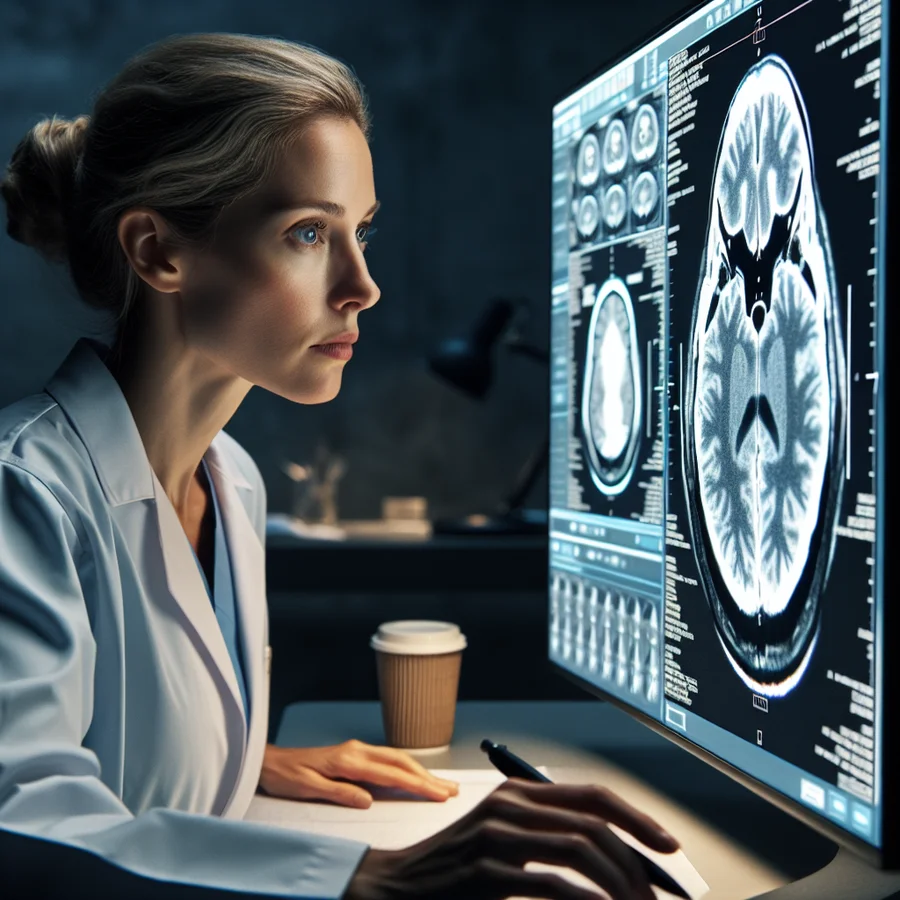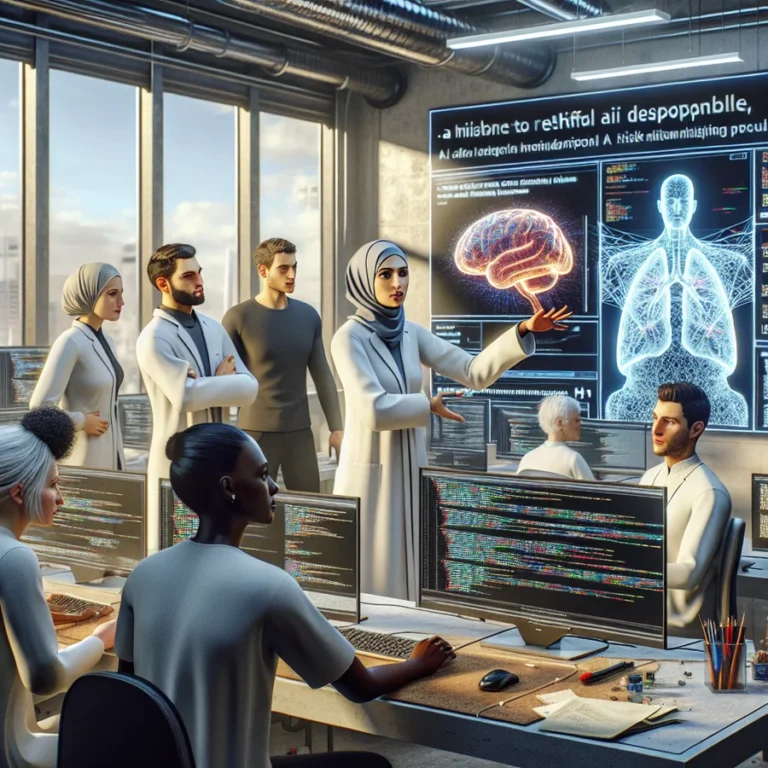AI in Healthcare Diagnostics: Improving Accuracy and Speed
Imagine a world where diseases are detected earlier and with greater accuracy. Treatments are personalized to your unique needs. This is the promise of AI in healthcare diagnostics. Artificial intelligence is rapidly transforming how we approach medical care. It’s offering new possibilities for improving both accuracy and speed in diagnosing illnesses.
This guide explores how AI in healthcare diagnostics is revolutionizing the medical field. We will delve into the specific applications, benefits, challenges, and future prospects of this transformative technology. Discover how AI is helping doctors make better decisions, leading to improved patient outcomes and a more efficient healthcare system.
The Rise of AI in Healthcare Diagnostics
Artificial intelligence (AI) is no longer a futuristic concept. It’s a present-day reality in healthcare. AI refers to the simulation of human intelligence in machines. These machines are programmed to think and learn like humans. This includes learning, reasoning, problem-solving, perception, and language understanding.
The healthcare industry is experiencing a significant transformation. This is driven by the increasing availability of data and advancements in AI algorithms. AI’s ability to analyze vast amounts of complex medical data is unparalleled. This capability enhances the accuracy and efficiency of diagnostic and treatment processes.
Key Areas Where AI Impacts Healthcare
- Analyzing Complex Medical Data: AI systems excel at processing large volumes of data. They identify trends and patterns that humans might miss.
- Improving Diagnostic Accuracy: AI algorithms support clinicians in diagnosing diseases more accurately. AI-powered tools in radiology can detect abnormalities with high precision.
- Enhancing Treatment Planning: AI assists in creating personalized treatment plans. It considers a patient’s genetic information, lifestyle, and medical history.
- Predictive Analytics: AI can predict potential health risks by analyzing patterns in patient data. This is crucial for preventive medicine.
- Streamlining Administrative Processes: AI aids in administrative tasks like scheduling and billing, improving overall efficiency.
The integration of AI into healthcare is not just about automating tasks. It’s about augmenting the capabilities of healthcare professionals. This leads to more informed decisions and better patient care.
How AI Improves Accuracy in Medical Diagnostics
One of the most significant advantages of AI in healthcare diagnostics is its ability to improve accuracy. AI algorithms can analyze medical images, lab results, and patient data with remarkable precision. This leads to earlier and more accurate diagnoses.
Reminder: AI is a tool to assist healthcare professionals, not replace them. Human oversight is still crucial.
AI in Medical Imaging Analysis
Medical imaging is a crucial aspect of diagnostics. AI is revolutionizing this field through deep learning. Deep learning involves neural networks that can process and interpret complex image data.
AI algorithms are trained to detect subtle abnormalities in medical images. These images include X-rays, MRIs, and CT scans. AI can spot patterns that are not easily visible to the human eye. This enhances diagnostic accuracy, especially in early disease detection.
Example: AI has shown success in detecting breast cancer in mammograms and identifying lung nodules in chest X-rays.
AI systems provide consistent analysis. They are unaffected by human factors like fatigue or bias. They can also process images much faster than human radiologists. This leads to quicker diagnoses and timely treatment.
AI in Pathology
Pathology involves the study of diseases through the examination of tissues and body fluids. AI is used to analyze tissue samples with greater precision than traditional methods. It can identify signs of diseases like cancer by examining cell patterns.
AI’s accuracy in diagnosing various types of cancer has improved significantly. It helps distinguish between benign and malignant tumors. It also grades cancer severity. Integrating AI into pathology labs automates the workflow. This reduces the workload of pathologists, allowing them to focus on more complex cases.
AI in Predictive Diagnostics
Predictive diagnostics involves using data to forecast potential health risks. AI tools analyze a wide range of patient data. This includes medical history, genetic information, and lifestyle factors.
By identifying patterns and correlations in this data, AI can predict the likelihood of diseases. These diseases include diabetes, heart attacks, or strokes. This prediction often happens before clinical symptoms are evident. These predictive models provide personalized risk assessments. This enables preventative measures and early interventions tailored to the individual patient.
Note: AI systems continuously learn and improve their predictive accuracy. They do this by incorporating new patient data and research findings.
Accelerating Diagnostic Speed with AI
Beyond accuracy, AI in healthcare diagnostics significantly accelerates the speed of diagnosis. AI can process vast amounts of data much faster than humans. This reduces waiting times for patients and allows for quicker treatment initiation.
AI is transforming diagnostic workflows. It reduces what once took hours of human effort into minutes of machine processing. This is particularly valuable in emergency situations where time is critical.
Examples of AI Speeding Up Diagnostics
- Radiology: AI-powered tools can cut MRI analysis time by 30% and slash report processing by half.
- Spine MRI Exams: AI can decrease spine MRI exam durations by 70% without compromising image quality.
These advancements allow critical diagnoses to happen faster. This gives patients quicker access to necessary treatments and enables earlier recovery.
Personalized Treatment Plans and AI
AI in healthcare diagnostics is also enabling more personalized treatment plans. AI algorithms can analyze individual patient data to create treatment strategies tailored to their specific needs.
AI refines healthcare diagnostics by crafting precise, personalized treatment plans. This notably reduces hospital readmissions for chronic illnesses by as much as 40%. This is propelled by AI’s meticulous analysis of individual health data. This encompasses everything from vital signs to medical histories and genomic profiles.
Example: In oncology, AI is used to develop treatment strategies aligned with the unique genetic makeup and lifestyle of cancer patients.
AI empowers healthcare providers to implement finely tuned interventions. These are custom-crafted to meet the granular specifics of each patient’s health needs. Wearable health devices integrated with AI can monitor patient health in real-time. This allows for ongoing adjustments to treatment plans based on the data collected.
AI in Drug Development
AI is also playing a crucial role in drug development. AI algorithms can process vast amounts of biological and chemical data at an unprecedented speed. This significantly accelerates the drug discovery process.
AI models can predict how different drugs will interact with various diseases. This helps identify potential new uses for existing drugs. It also helps avoid harmful drug interactions.
By improving the efficiency of the drug development process, AI can help reduce overall costs and time. This facilitates faster access to new treatments for patients. AI can aid in designing clinical trials. It helps identify suitable candidates and monitors trial progress. This improves the efficacy and safety of new drugs.
Robot-Assisted Surgery Enhanced by AI
AI-powered robotic systems offer surgeons greater precision and control during procedures. These robots can perform complex surgeries with minimal invasiveness. This is especially beneficial in areas like neurosurgery and orthopedics.
AI enhances surgical visualization. It provides surgeons with detailed 3D models of the patient’s anatomy. This helps in planning the surgical procedure. It also helps in navigating complex processes.
Surgeries performed with the assistance of AI-driven robots typically result in smaller incisions. This leads to less blood loss and a lower risk of infection. This leads to quicker recovery times and shorter hospital stays. AI-driven simulations offer surgeons the opportunity to practice and refine their skills in a virtual environment. This enhances their proficiency and preparedness for real-life surgeries.
Benefits of AI in Healthcare
The implementation of AI in healthcare diagnostics brings numerous advantages. These advantages enhance accuracy, efficiency, and cost-effectiveness. These benefits improve patient outcomes and streamline healthcare operations.
Increased Accuracy
AI systems can process and analyze vast amounts of data quickly and accurately. This includes medical records, imaging data, and lab results. With advanced algorithms, AI can detect subtle patterns and anomalies in medical data. This precision is significant in areas like radiology and pathology.
By providing more accurate diagnostic insights, AI helps in reducing errors. Misdiagnoses and delayed diagnoses can have profound implications for patient care. AI minimizes these errors, which is a significant advancement. AI acts as a support tool for clinicians. It offers evidence-based recommendations and insights. This leads to more informed decision-making and tailored treatment strategies.
Efficiency
AI can significantly reduce the time required for diagnosing diseases. AI-driven image analysis tools can process and interpret scans much faster than traditional methods. This leads to quicker diagnosis and timely initiation of treatment. AI automates routine and administrative tasks. This includes scheduling, documentation, and patient communication. This automation frees up healthcare professionals to focus more on direct patient care.
Cost Reduction
By taking over routine and time-consuming tasks, AI reduces the workload on healthcare staff. This can translate to lower labor costs and operational expenses. Accurate diagnostics and effective treatment plans mean fewer complications. This means less need for repeat procedures and shorter hospital stays. All of which contribute to cost savings.
AI helps efficiently allocate and utilize healthcare resources. This includes managing hospital bed occupancy and optimizing equipment use. AI’s role in predictive diagnostics leads to early interventions. This prevents the progression of diseases into more severe and costly stages.
Challenges and Considerations for AI in Healthcare
While AI in healthcare diagnostics offers transformative possibilities, it also presents several challenges. These include data privacy, ethical considerations, and integration into existing healthcare systems.
Data Privacy
The use of AI in healthcare involves processing vast amounts of sensitive patient data. Ensuring the confidentiality of this data is paramount. AI systems must be designed with robust security measures. These measures prevent data breaches and unauthorized access to patient information. Healthcare providers must ensure that AI applications comply with data protection regulations.
Reminder: It is crucial to obtain informed consent from patients for the use of their data in AI applications.
Ethical Considerations
AI algorithms can inadvertently perpetuate biases present in their training data. This raises ethical concerns about fairness and equity. It’s essential to strike a balance where AI supports, rather than replaces, the judgment of healthcare professionals. In cases of AI-driven errors, determining liability and accountability can be challenging. Clear guidelines and frameworks are needed to address these issues. AI applications should respect patient autonomy.
Integration into Healthcare Systems
Integrating AI tools into existing healthcare infrastructure can be challenging. This is especially given the wide variety of electronic health record systems in use. Healthcare professionals need adequate training to use AI tools effectively. The initial cost of implementing AI can be high. Continuously monitoring and assessing the effectiveness of AI applications in clinical settings is crucial.
The Future of AI in Healthcare Diagnostics
The future of AI in healthcare diagnostics is promising. AI is poised to bring about a significant transformation. It will reshape how clinicians diagnose, treat, and manage patient care. New AI technology in healthcare stands ready to improve patient outcomes across a broad spectrum.
AI tools will soon help predict disease progression. They will do this by detecting subtle warning signals in patient data. This enables earlier, more effective interventions. Such advancements promise to improve care quality. They will also reduce preventable complications and related costs. Beyond diagnostics, surgical care will benefit from AI-driven real-time remote assistance.
The AI healthcare market is expected to grow significantly in the coming years. This growth suggests that substantial transformations are anticipated in the operations of medical providers. The integration of AI into the medical field has brought about a paradigm shift. This makes healthcare more efficient, accurate, and personalized. As AI technology continues to evolve, its role in healthcare is set to become even more significant.
Conclusion
AI in healthcare diagnostics is revolutionizing the medical field. It is improving accuracy, speed, and personalization in healthcare. While challenges remain, the potential benefits are immense. As AI technology continues to advance, we can expect even more innovative applications. These applications will transform how we diagnose and treat diseases. This will lead to better patient outcomes and a more efficient healthcare system for all.
FAQs
How is AI currently used in medical diagnostics?
AI is used in medical diagnostics for analyzing medical images (X-rays, MRIs), pathology (tissue sample analysis), and predictive diagnostics (predicting disease risks based on patient data).
What are the main benefits of using AI in healthcare diagnostics?
The main benefits include increased accuracy, faster diagnosis, personalized treatment plans, and reduced costs.
What are the challenges of implementing AI in healthcare diagnostics?
The challenges include ensuring data privacy, addressing ethical concerns, and integrating AI into existing healthcare systems.
How does AI improve the accuracy of medical diagnoses?
AI improves accuracy by processing and analyzing vast amounts of data quickly and accurately, detecting subtle patterns and anomalies in medical data that humans might overlook.
Can AI replace doctors in medical diagnostics?
No, AI is a tool to assist healthcare professionals, not replace them. Human oversight is still crucial for making informed decisions.
How is AI used in personalized medicine?
AI is used in personalized medicine to analyze a multitude of factors, including a patient’s genetic profile, lifestyle, previous health records, and current health conditions, enabling the development of highly tailored treatment plans.
What is the role of AI in drug development?
AI algorithms can process vast amounts of biological and chemical data at an unprecedented speed, significantly accelerating the drug discovery process and predicting drug interactions.
How does AI contribute to cost reduction in healthcare?
AI contributes to cost reduction by automating routine tasks, reducing diagnostic and treatment errors, optimizing resource utilization, and enabling preventive health management.
What are the ethical considerations when using AI in healthcare?
Ethical considerations include addressing biases in AI algorithms, ensuring patient data privacy, determining accountability in cases of AI-driven errors, and respecting patient autonomy.
What is the future of AI in healthcare diagnostics?
The future of AI in healthcare diagnostics is promising, with AI poised to bring about a significant transformation in how clinicians diagnose, treat, and manage patient care, leading to better patient outcomes and a more efficient healthcare system.






